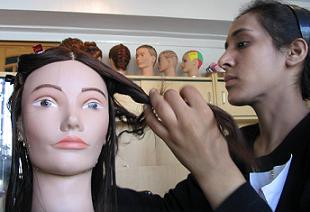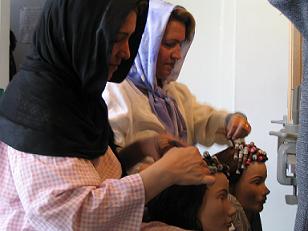The Beauty Academy of Kabul


As events in Iraq continue to spark intense debate on all sides of the political spectrum, nearby Afghanistan slowly begins to process of rebuilding. While the atmosphere can still be dangerous, it is safe enough for a group of American beauticians, with the backing of companies like Vogue, MAC, and Clairol, to open a beauty academy in Kabul in 2004. The concept sounds quite ridiculous and read-made for mocking, but once director Liz Mermin wants viewers to realize is that something as small a good session at the hair salon can do much to bringing a sense of normalcy to a war-torn nation.
In fact, when Mermin takes the camera into the lives of the Afghani women, The Beauty Academy of Kabul soars. Many of these women operated small salons out of their houses under Taliban rule. This was highly illegal, and could result in severe punishment, and possibly even death. Yet, these operations still thrived, and even Taliban wives were customers. Mermin, the American beauticians, and crew visit some of these salons, and the Afghani women open their houses and life stories to their guests. Through years of oppression, these women still managed to thrive, and in once case, support her family through the salon. Another woman worked the salon, took care of children, and cooked for her family.
So how can something so simple take on so much meaning? There were similar stories about a barbershop in Afghanistan a few years ago. This is something that people can enjoy. It takes their minds off serious topics like war and death. Just because the Taliban forced women to wear burkas in public did not mean that they couldn't do anything underneath the veils. Is this all a bit superficial? No more so than how women all over the world (or men for that matter) feel about hair. On a deeper level, the beauty academy serves as a source of empowerment for these women. In a traditionally male dominated society, these women were blazing a trail of independence. Here, they could attend school and eventually open a business, two things strictly forbidden under the former regime. Not only were the American beauticians bringing in modern methods of styling, but also modern ( i.e. Western) attitudes to Kabul.
Which is where some of the cringe-inducing culture clash moments come in. The beauticians that went to Kabul were a combination of American women and Afghani women who left years ago. The latter group had some touching homecoming moments. The former...well, while they had good intentions, some seemed blissfully ignorant of the vast chasm in morals and attitudes between the West and Afghanistan. Whether it is right or wrong, attitudes in Afghanistan are extremely different than from those in America. Changing them will not happen overnight (witness the recent frenzy over the potential death penalty for a Muslim convert to Christianity), but not all the women thought this way. How else to explain one stylists idea for large windows so that people in the street could look in? Did she know that some women still preferred a sense of modesty? Or another's idea to have them meditate before starting the day? And although much of it is due to editing, it sure seemed like they made very little effort to learn Farsi (how helpful is it when one walks up and down the aisle saying things like "great job" and "you're doing well?"). Still, once faced with the reality of the situation of the Afghani women, they are devastated by chasm between what American women take for granted and what little freedom the Afghani women have. For the Americans to see what Afghani women are missing, and for the Afghan women to see what they can one day achieve, gives both a renewed sense of purpose. Yeah, it's only hair, but it can be so much more.